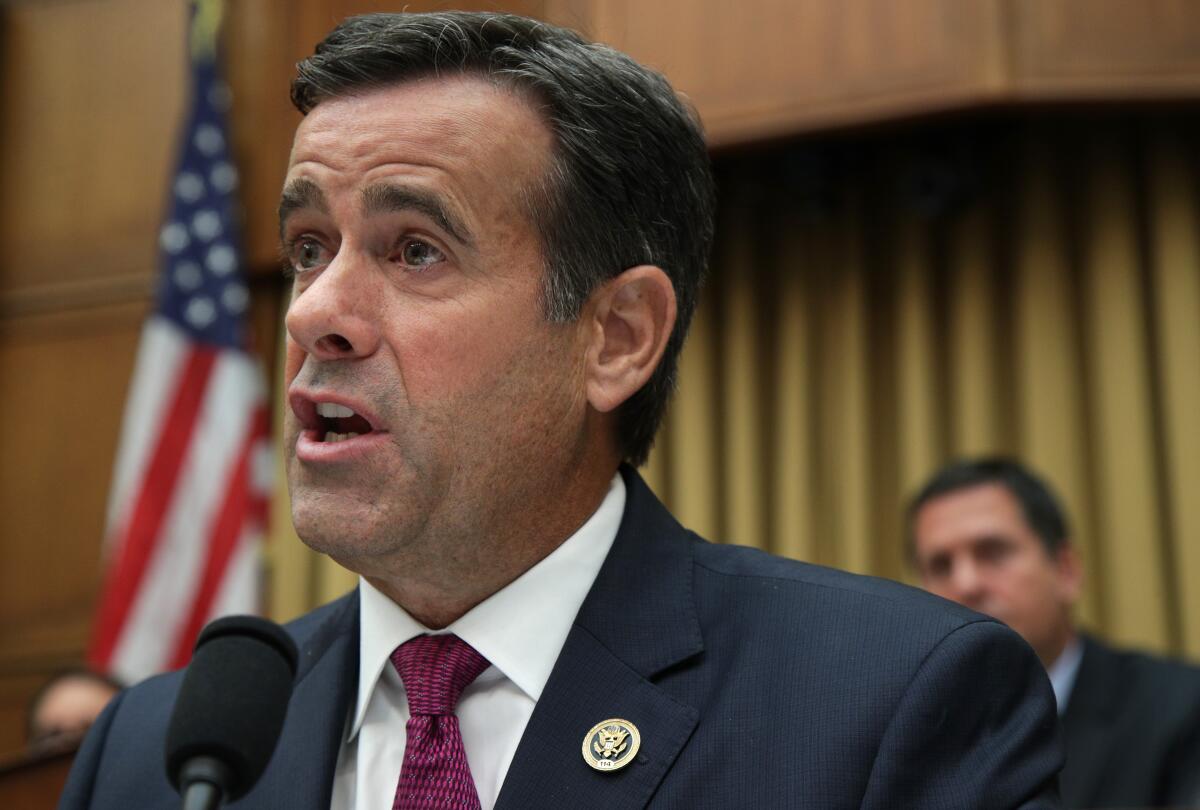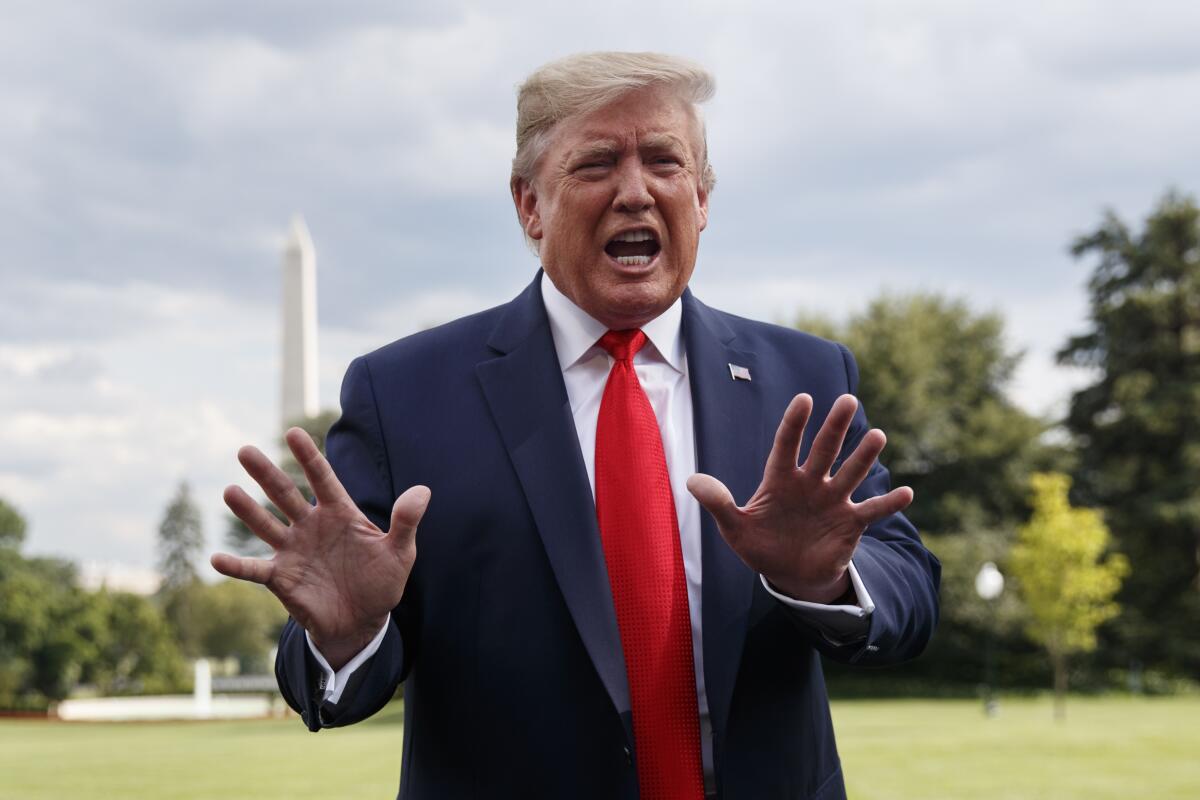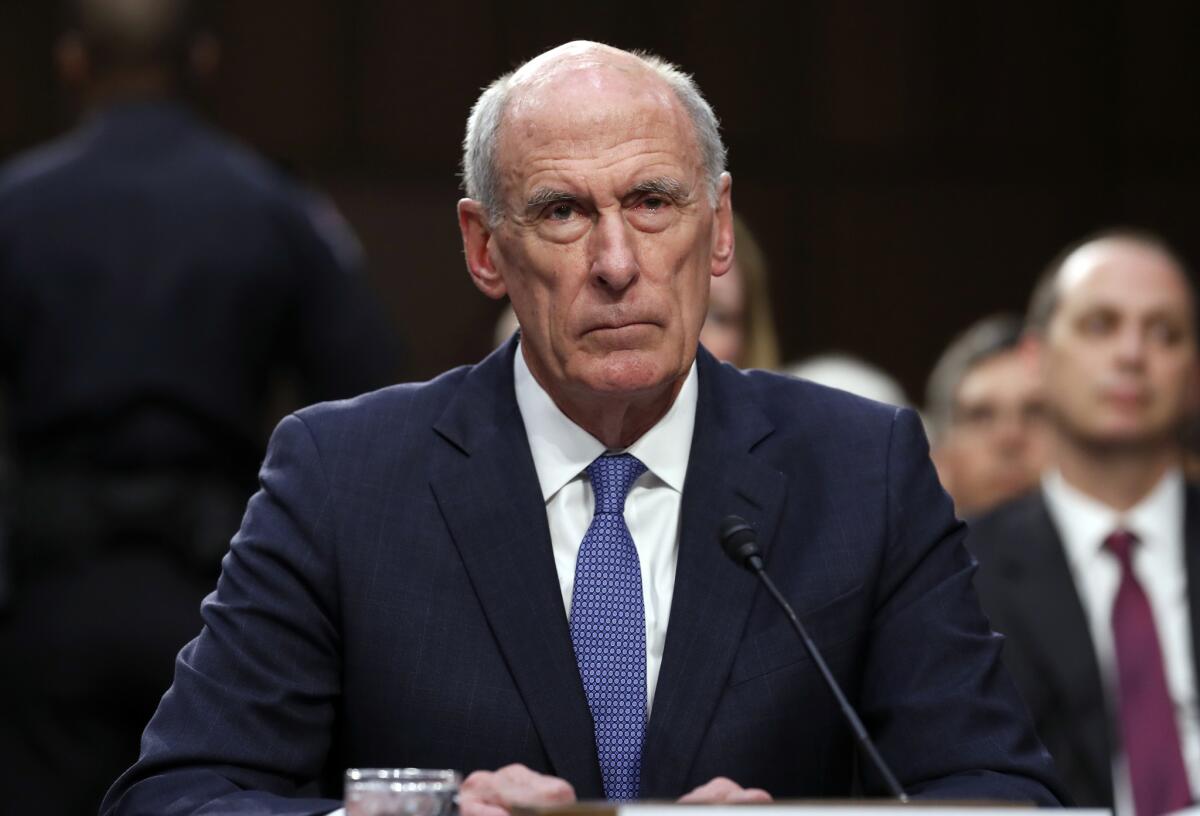Trump likes aides to tell him what he wants to hear. Will his pick for intelligence chief do likewise?

- Share via
WASHINGTON — President Trump’s choice of a Republican congressman with little national security experience to serve as his top intelligence advisor is another step in his slow-motion purge of administration officials who offer facts that challenge his worldview.
Rep. John Ratcliffe (R-Texas), a former small town mayor and U.S. attorney who appears to have overstated his role in terrorism prosecutions, would replace Dan Coats, who spent more than two decades in Congress and served as ambassador to Germany before becoming the director of national intelligence.
Trump told reporters that Ratcliffe, who fiercely defended him during last week’s congressional hearings with former special counsel Robert S. Mueller III, would curb an intelligence community that the president has feuded with ever since winning the White House.
“We need somebody strong, that can really rein it in,” he said on Tuesday. “Because as I think you’ve all learned, the intelligence agencies have run amok.”
Trump’s choice of Ratcliffe is the latest example of the president eschewing veteran advisors — including diplomats, economists and White House staff — in favor of loyalists and television personalities who are reluctant to tell him inconvenient facts. As Trump prepares for his reelection campaign, most members of his original team have left the administration or been forced out, leaving him with fewer dissenting voices than ever.
“The most important thing to do is tell the president what he does not want to hear,” said Chris Whipple, author of “The Gatekeepers,” a book about White House chiefs of staff and presidential decision making. “Trump just doesn’t have many people like that in his White House. And that’s a shame.”
Senate Republicans have previously rebuffed a few of Trump’s most controversial personnel choices, and so far they have shown little enthusiasm for Ratcliffe, who has not yet been formally nominated.

The decision to replace Coats comes as Trump faces a cascade of national security challenges that have revealed a stark gap between the president’s beliefs and the analysis of his intelligence officials.
Trump continues to express confidence that his theatrical meetings with Kim Jong Un will lead North Korea to give up its nuclear weapons even though there’s been little progress toward that goal. He’s also embroiled in an escalating conflict with Iran after withdrawing from the nuclear agreement reached by President Obama despite evidence that Tehran was upholding its side of the deal.
In addition, the president has cast off repeated warnings from national security officials that Russia is preparing to meddle in next year’s election, perhaps by following the same playbook that Moscow used to help Trump win the White House.
Coats frustrated Trump by presenting the intelligence community’s analysis — sometimes publicly in congressional testimony — even when it contradicted the president’s views.
“Dan made statements, and they were a little confused,” Trump said on Tuesday.
The president also signaled that he would take other aggressive steps to reshape the intelligence community, which he once compared to Nazi Germany for leaking derogatory information about him.
Coats is scheduled to step down on Aug. 15, and the law requires his deputy, Sue Gordon, to serve as his temporary replacement while the president’s permanent choice awaits confirmation. But Trump suggested he would name somebody else.
The national intelligence director position was created after the 9/11 terrorist attacks exposed seams in the country’s security infrastructure. It’s intended to synthesize the collection and analysis of intelligence across several agencies, including the CIA, the National Security Agency and the FBI.
The office is also responsible for preparing the president’s daily brief, a distillation of the latest classified information from around the globe. What’s included — and what’s left out — can have an outsized impact on White House decisions.
“It’s the most important thing they do,” said Larry Pfeiffer, who worked in the office when it was first created during President George W. Bush’s administration.
Michael E. O’Hanlon, a senior fellow at the Brookings Institution, said Ratcliffe could imperil Trump’s presidency if he doesn’t commit to sharing unbiased information with the White House.
“He will need to change his approach fundamentally — or Trump himself could be the first to suffer,” he said. “You can make big foreign policy mistakes based on bad intel.”
National intelligence directors are required by law to have “extensive national security expertise” before they can oversee the nation’s vast spying apparatus, which includes more than 100,000 people and a budget exceeding $60 billion.
Unlike his predecessors, Ratcliffe has never served in the military or the intelligence community, and he appears to have overstated his role pursuing terrorism cases as U.S. attorney in the eastern district of Texas, which covers a large rural swath of the state.
One of his press releases says, “he convicted individuals who were funneling money to Hamas behind the front of a charitable organization,” a reference to the U.S. vs. Holy Land Foundation case. Ratcliffe was responsible for examining why the first of two trials resulted in a mistrial, but he did not prosecute the case.

So far Ratcliffe has received a tepid response from Senate Republicans. Several of them said they simply did not know Ratcliffe, a three-term congressman who began serving on the House Intelligence Committee earlier this year.
Senate Majority Leader Mitch McConnell (R-Ky.) said he’s predisposed to support the president’s nominees but declined to say whether Ratcliffe was qualified for the job.
“I haven’t met him yet,” he said.
McConnell effusively praised Coats on Sunday when Trump announced that he was replacing him.
“My friend and former colleague has devoted decades of his life in service to our country,” McConnell said. “I was reassured knowing that a man who took such a deliberate, thoughtful, and unbiased approach was at the helm of our intelligence community.”
Democrats were outspoken in their opposition. Sen. Mark R. Warner (D-Va.), the vice chairman of the Senate Intelligence Committee, said national security officials must “speak truth to power.”
“That was not the kind of performance that I saw” when Ratcliffe questioned Mueller during last week’s congressional hearings, Warner said. Ratcliffe did not ask about Russian election interference, instead focusing on Democrats’ funding of a dossier of unverified allegations about Trump. He also blasted Mueller for saying Trump was not exonerated by the investigation, accusing him of overstepping his role as a prosecutor.
Atty. Gen. William Barr is in the middle of investigating how the Russia investigation began, and Trump gave him unusual authority to review and declassify intelligence. If confirmed as the national intelligence director, Ratcliffe could play a key role.
Mary McCord, a former top national security official at the Justice Department, said there was hope that Coats would push back on unreasonable requests. “With somebody like Ratcliffe, who seems to be pretty much like a sycophant, I don’t think we can rely on any kind of check on what Barr is seeking,” she said.
Ratcliffe appears to already agree that there was wrongdoing in the investigation.
“I’m not going to accuse any specific person of any specific crime, I just want there to be a fair process to get there,” Ratcliffe told Fox News on Sunday, hours before Trump announced that he would replace Coats. “What I do know as a former federal prosecutor is that it does appear that there were crimes committed during the Obama administration.”
More to Read
Get the L.A. Times Politics newsletter
Deeply reported insights into legislation, politics and policy from Sacramento, Washington and beyond. In your inbox twice per week.
You may occasionally receive promotional content from the Los Angeles Times.











